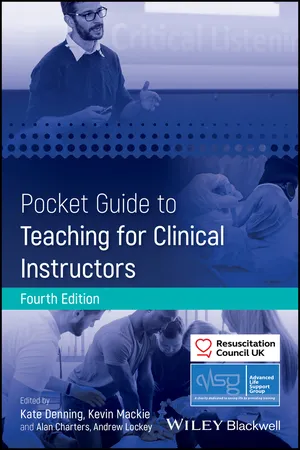
Pocket Guide to Teaching for Clinical Instructors
- English
- ePUB (mobile friendly)
- Available on iOS & Android
Pocket Guide to Teaching for Clinical Instructors
About this book
New edition of the popular guide to the practical aspects of teaching and fundamental learning principles in clinical practice
Pocket Guide to Teaching for Clinical Instructors contains theoretical input on all the modalities of teaching and assessment required for life support training through the Advanced Life Support Group and Resuscitation Council UK blended learning approach. This guide does not attempt to provide a blueprint for teaching—rather, it gives advice about the basics, which can be adapted to your personality and creativity.
This Fourth Edition has been thoroughly revised and updated to reflect the latest in the evolution of education methods applicable to provider courses. The text is relevant to a 21st century audience and graphics have been introduced to make the materials more readable, applicable, and accessible.
Written by a team of highly experienced educators, Pocket Guide to Teaching for Clinical Instructors:
- Takes an evidence-based approach to how our brains manage and process information in order for learning to occur
- Provides a structured approach to teaching the different modalities used on the courses: lectures, skill stations, scenarios, workshops, debriefing as a learning conversation
- Explores neurodiversity, psychological safety, cognitive load, non-technical skills, and inclusive teaching
- Discusses blended learning, the wider role of the instructor and the variety of approaches to assessment
Pocket Guide to Teaching for Clinical Instructors is a concise, practical guide for anyone interested in teaching healthcare professionals in any context.
Advanced Life Support Group (ALSG), Manchester, UK. ALSG's medical education & training programs improve outcomes for people in life-threatening situations, anywhere along the health care pathway, anywhere in the world. As a charity, ALSG invests all profits in educational resources and partners with the most effective and respected organizations worldwide to develop exceptionally high-quality programs. ALSG education quality is verified, accredited, and internationally recognised as 'best in class'.
Resuscitation Council UK (RCUK) is the UK's leading authority on resuscitation practice and has a strong international reputation. RCUK develops the UK's evidence-based resuscitation guidelines, provides training and education for healthcare professionals and the public, and supports research to improve resuscitation techniques and outcomes. RCUK champions public awareness about the importance of CPR and defibrillator use and campaigns for policies and legislation that promote quality improvement initiatives to enhance resuscitation efforts and survival rates. RCUK is dedicated to ensuring that everyone in the country has the skills they need to save a life.
Frequently asked questions
- Essential is ideal for learners and professionals who enjoy exploring a wide range of subjects. Access the Essential Library with 800,000+ trusted titles and best-sellers across business, personal growth, and the humanities. Includes unlimited reading time and Standard Read Aloud voice.
- Complete: Perfect for advanced learners and researchers needing full, unrestricted access. Unlock 1.4M+ books across hundreds of subjects, including academic and specialized titles. The Complete Plan also includes advanced features like Premium Read Aloud and Research Assistant.
Please note we cannot support devices running on iOS 13 and Android 7 or earlier. Learn more about using the app.
Information
Table of contents
- Cover
- Table of Contents
- Title Page
- Copyright Page
- Working group
- Contributors to the fourth edition
- Foreword
- Preface to the fourth edition
- Acknowledgments and dedication
- CHAPTER 1: Learning
- CHAPTER 2: Inclusive teaching
- CHAPTER 3: Facilitating learning
- CHAPTER 4: Facilitating workshops and small groups
- CHAPTER 5: Learning skills
- CHAPTER 6: Managing simulations
- CHAPTER 7: Psychological safety
- CHAPTER 8: Debriefing as a learning conversation
- CHAPTER 9: Assessing
- CHAPTER 10: Lectures and presentations
- CHAPTER 11: Blended learning
- CHAPTER 12: Non‐technical skills
- CHAPTER 13: The wider role of the instructor
- References and further reading
- Index
- How to use your textbook
- Contributors to the first, second and third editions
- End User License Agreement